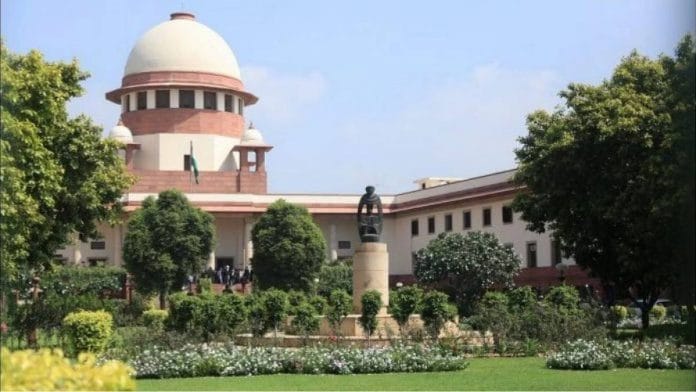New Delhi: Taking a dim view of the persistent feud between Governors appointed by the party in power at the Centre and the governments in Opposition-ruled states over crucial executive decisions, the Supreme Court Tuesday urged the nominal head not to create roadblocks and respect the will of the people.
In its judgment on the litigation between Tamil Nadu Governor R.N. Ravi and the state government over the former’s withholding of assent on crucial bills passed by the assembly, the top court urged all Governors to remember their constitutional obligations, which is to work for the welfare of citizens and perform the role of a friend, philosopher and guide with dispassion and no political considerations.
“The Governor must be conscious to not create roadblocks or chokehold the state legislature in order to thwart and break the will of the people for political [reasons]. The members of the state legislature, having been elected by the people of the state as an outcome of the democratic expression, are better attuned to ensure the well-being of the people of the state,” the court said, taking a stern view of the growing trend of Governors attempting to circumvent the elected state governments.
A Bench led by Justice J.B. Pardiwala, declared Governor Ravi’s action of withholding assent for 10 bills—the oldest of them pending since as far back as January 2020—and referring them to the President after they were re-enacted by the state legislature, as “illegal and erroneous”.
According to the top court’s judgment, in case the Governor decides to withhold assent and reserve the Bill for President’s consideration, the same must be done within a period of maximum one month. In case of withholding of bills, which is contrary to the advice of the state government, the Governor shall return the bills with a message within a period of maximum three months.
Those occupying high office must be guided by the values of the Constitution, the Bench said, while highlighting the struggles of the freedom movement leading to Independence.
“These values that are so cherished by the people of India are a result of years of struggle and sacrifice of our forefathers. When called upon to take decisions, such authorities must not give in to political considerations, but rather be guided by the spirit that underlies the Constitution,” the court said.
An action taken by a Constitutional authority must be informed by their oath to further the ideas enshrined in the Constitution, the Bench asserted. “With an attempt to deliberately bypass the Constitution, they are tinkering with the very ideals revered by its people upon which this country has stood.”
In the Governor’s case, if an action is contrary to the “express choice of people, in other words, the state legislature”, then it would be a “renege of his constitutional oath”.
On the Governor’s role as a guide, the Bench said: “In times of conflict, he must be the harbinger of consensus and resolution, lubricating the functioning of the state machinery by his sagacity, wisdom, and not run it into a standstill. He must be the catalyst and not an inhibitor. All his actions must be impelled, keeping in mind the dignity of the high constitutional office.”
(Edited by Mannat Chugh)







I believe the TN governor has cleared a lot of proposals well in time. A few he held back because he considered then not in the best interest of the country. The present TN government has constantly tried to upstage the governor – even at the cost of putting the country back. Anyways..